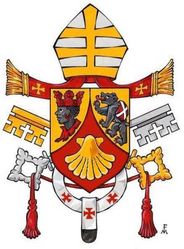Vatican
City, 15 December 2009 (VIS) – Made public today was Benedict XVI’s Motu
Proprio, “Omnium in mentem”. The document is dated 26 October 2009
and contains two variations to the Code of Canon Law (CIC), variations which
have long been the object of study by dicasteries of the Roman Curia and by
national episcopal conferences.
The document published today contains five
articles modifying canons 1008, 1009, 1086, 1117 and 1124. According to an
explanatory note by Archbishop Francesco Coccopalmerio, president of the
Pontifical Council for Legislative Texts, these variations “concern two
separate questions: adapting the text of the canons that define the ministerial
function of deacons to the relative text in the Catechism of the Catholic Church (1581), and suppressing a subordinate clause in three canons concerning
marriage, which experience has shown to be inappropriate”.
The variation
to the text of canon 1008 will now limit itself to affirming that “those
who receive the Sacrament of Orders are destined to serve the People of God
with a new and specific title”, while canon 1009 “will be given an
additional third paragraph in which it is specified that the minister
constituted into the Order of the episcopate or the priesthood receives the mission
and power to act in the person of Christ the Head, while deacons receive the
faculty to serve the People of God in the diaconates of the liturgy, of the
Word and of charity”.
Archbishop Coccopalmerio’s note then goes on to
explain that the other changes contained in the Motu Proprio all concern the
elimination of the clause “actus formalis defectionis ab Ecclesia
Catholica” contained in canons 1086 para. 1, 1117 and 1124. This clause,
“following much study, was held to be unnecessary and inappropriate”,
he writes.
“From the time the Code of Canon Law came into effect in the
year 1983 until the moment of the coming into effect of this Motu Proprio,
Catholics who had abandoned the Catholic Church by means of a formal act were
not obliged to follow the canonical form of celebration for the validity of
marriage (canon 1117), nor were they bound by the impediment concerning
marriage to the non-baptised (canon 1086 para. 1), nor did they suffer the
prohibition on marrying non-Catholic Christians (canon 1124). The
abovementioned clause contained in these three canons represented an exception
… to another more general norm of ecclesiastical legislation according to
which all those baptised in the Catholic Church or received into her are bound
to observe ecclesiastical laws (canon 11).
“With the coming into effect of
the new Motu Proprio”, Archbishop Coccopalmerio adds, “canon 11 of
the Code of Canon Law reacquires its full force as concerns the contents of the
canons thus modified, even in cases were there has been a formal abandonment.
Hence, in order to regularise any unions that may have been made in the
non-observance of these rules it will be necessary to have recourse, if
possible, to the ordinary means Canon Law offers for such cases: dispensation
from the impediment, sanation, etc”.
The Latin and Italian texts are here.
